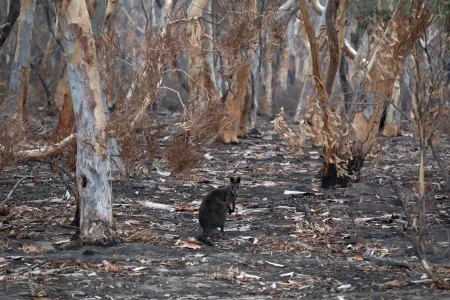News
Experts say radical shift needed in our relationship with the environment
A radical shift in our relationship with the environment is needed and it is time we intervene in the extinction crisis, experts say.
A review led by Charles Darwin University (CDU) found negative trends in Australian biodiversity loss – caused by invasive species, interrupted First Nations land and sea management, altered fire regimes, and changed water flows – could rapidly worsen unless policymakers act with haste.
CDU Research Institute for Environment and Livelihoods (RIEL) researcher, Australian National University Honourary Professor, and lead author Professor Sarah Legge said there was a desperate need for increased investment, policy reform and expanded conservation management.
“Current reform of Australia’s environmental legislation could mark transformational change,” Professor Legge said.
“An accumulating array of threats to Australian biodiversity reflect the low value placed on conservation of the environment, with this perspective deeply ingrained in inadequate legislation, policy and management.”
According to the study, extinction risks for Australian mammals are far exceeding the global average.
University of Melbourne researcher Dr Libby Rumpff said a radical shift in our relationship with the environment was needed to reduce the high risks of extinction.
“Predictions of ecosystem collapse and escalating extinction rates of Australian endemic species could become reality if biodiversity threats aren’t adequately controlled. Effective recovery requires society to reframe its relationship with the environment.”
CDU RIEL researchers and co-authors Professors John Woinarski and Stephen Garnett note the inadequacies that have contributed to past and ongoing biodiversity declines, but also that there are examples of conservation success to build on.
“These losses in biodiversity are symptomatic of shortcomings in resourcing, law, policy, and management,” Professor Woinarski said.
“Yet we have seen enough examples of advances in conservation practice from invasive species control, First Nations land management, and citizen science to know that these are effective ways to control biodiversity threats and reduce the risk of extinction rates escalating across all animal groups.
“These methods can achieve success, but such management must be strategically expanded in scale and intensity, and renewed funding and stronger legislation would support this expansion.”
The study also suggests climate change is having a compounding effect on both existing threats and new environmental stresses, causing population declines, ecosystem shifts and severe wildfires.
“Environmental impacts, including habitat loss, are now compounded by climate change, particularly through extreme drought, heat, wildfire, and flooding,” Professor Garnett said.
“Given that the incidence of extensive and severe fires will increase with ongoing climate change, some ecosystems and species are unlikely to recover before the next comparable event.
“This could lead to major shifts in vegetation composition and losses of many species, especially among animal and plant groups of ancient lineages that evolved under conditions of much less disturbance.
“These ongoing and escalating losses of our nature will affect us all, and blight the world we leave to our descendants. We have to craft a better world, transform the way we live in this country.”
Professors Legge, Woinarski and Garnett are members of The Biodiversity Council, which brings together leading Australian experts to raise awareness of Australia’s biodiversity crisis and to promote evidence-based solutions.
The review Loss of terrestrial biodiversity in Australia: Magnitude, causation, and response was published in Science.
Related Articles

First “hype cycle” of AI development put tech above humans
Users around the world have rushed to adopt artificial intelligence - especially in safety-critical fields - but a new study has revealed the hype has prioritised technology for technology’s sake instead of human-centred development.
Read more about First “hype cycle” of AI development put tech above humans
Nanoplastics hindering cognitive abilities of fish, international research shows
Nanoplastic exposure can impair the cognitive abilities of fish and could lead to significant impacts on marine species’ ability to survive, according to a new international study.
Read more about Nanoplastics hindering cognitive abilities of fish, international research shows
Eradication would cost billions: NT’s lessons for Pilbara’s cane toad management
Cane toads are predicted to invade Western Australia’s Pilbara region by 2041 if left unchecked, but the Northern Territory’s population of the pests hold key lessons that could save billions in eradication costs.
Read more about Eradication would cost billions: NT’s lessons for Pilbara’s cane toad management
